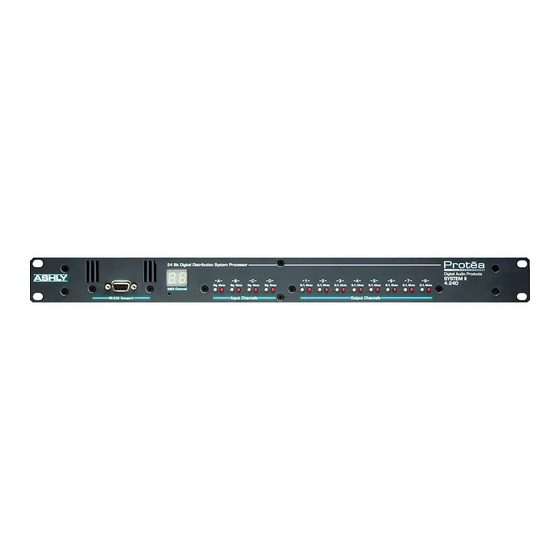Table of Contents
Advertisement
Advertisement
Table of Contents

Subscribe to Our Youtube Channel
Summary of Contents for Ashly Protea 4.24D
-
Page 2: Table Of Contents
6.3 Connecting the 4.24D to a Computer ....... . 8... - Page 3 Operating Manual - PROTEA SYSTEM II 4.24D Distribution / System Processor 9 TROUBLESHOOTING ..........16 9.1 Audio Troubleshooting Tips .
-
Page 4: Introduction
3. AC POWER REQUIREMENTS Note: The AC power switch for model 4.24D is on the back panel. The Protea 4.24D uses a universal input power supply which will accept any line voltage in the range of 80VAC to 260VAC, 50-60Hz, and is exceptionally resistant to voltage dips, or "brown outs". -
Page 5: Front Panel Features
Note that the Sig LEDs detect actual signal at the input connections, before any gain adjustments are made within the 4.24D. The red input mute LED becomes lit when an input channel is turned off through the use of software or MIDI control. -
Page 6: Rear Panel Features
The Protea 4.24D is designed to clip at signal levels above +20dBu = 7.75Vrms which places the noise floor lower than - 90dBu. The optimum input signal level which should be fed into the Protea processor is 0dBu = .775Vrms. This input level will allow 20dB of headroom while giving a nominal signal that is >90dB above the noise floor. -
Page 7: Contact Closure Connector
There may be times, however, where real time variables require changes in system settings, such as EQ, gain, and delay settings changing when a room size changes. For these types of changes, the 4.24D offers the ability to recall up to eight different presets using contact closures. -
Page 8: Protea System Software
6.3 Connecting the 4.24D to a computer A standard D-Sub nine pin female to male connector cable is used to connect the PC to the 4.24D. If the PC lacks a nine pin RS-232 port, an active USB to RS-232 converter can be purchased at computer stores. Here are the suggested steps for connecting the 4.24D to a PC:... -
Page 9: Getting Started
4.24D and Protea System Software. To change the MIDI channel for a 4.24D, use a sharp pencil tip or similar object to press the recessed switch beneath the MIDI channel display. If other Protea products are used in the MIDI loop, check their quick reference guide or owner's manual to verify all settings and connector types. -
Page 10: Audio Functions
7.4b Mute The 4.24D allows the user to mute all inputs or outputs. When muted, an input or output's red Mute LED is lit. To mute or unmute all outputs simultaneously, click on the <Mute> menu heading and select the <Mute all> or <Unmute all>... - Page 11 7.4d EQ The Protea 4.24D EQ section offers full parametric EQ as well as 1st and 2nd order shelving filters on inputs and outputs. Each input channel has six selectable EQ filters, while each output channel has four selectable EQ filters.
- Page 12 The steeper the slope, the more abruptly the "edges" of the pass band will drop off. There is no best filter slope for every application, so experiment to see which one sounds most pleasing in a specific system. The Ashly pre- loaded presets all use 24dB/octave filters in the crossover section, but of course they can be changed to suit the application.
- Page 13 24dB/ oct Linkwitz-Riley filters are the industry standard, the easiest to use, and the filter type recommended by Ashly. Other filter types are available, but may require polarity switching or other adjustments for proper results. The follow- ing paragraphs offer a summary of the three filter types as used in the 4.24C crossovers.
-
Page 14: Other Software Functions
These modified presets can then be saved to either disk or the 4.24D itself. For disk files, the file extension is <*.pdc>. For files saved to the 4.24D, they must number from 1 to 30 and the filename must be no more than 20 characters. -
Page 15: Midi Dump
Since there are no user controls on the 4.24D, the only way to load channel presets is by using Protea System Software to recall files saved on either the PC or the 4.24D. The exception to this is through the use of contact closures, where presets 1-8 from the 4.24D memory can be loaded using switches wired to the rear panel contact... -
Page 16: Factory Reset
7.) Excessive Noise - An input signal level or an input gain setting that is too low could require the loss to be made up for at the output gain stage, producing more noise than a properly set up gain structure. Do not use the 4.24D for dramatic increases in level, but rather optimize the signal source for a nominal 0dBu output. -
Page 17: Specifications
Environmental ..... 40°F - 120°F (4°C-49°C) Non-condensing 4.24D Weight ..... . 9 Lbs... -
Page 18: Dimensions
Operating Manual - PROTEA SYSTEM II 4.24D Distribution / System Processor 11. DIMENSIONS 12. WARRANTY INFORMATION The unit you have just purchased is protected by a limited five-year warranty . To establish the warranty, be sure to read completely, fill out and return the warranty card that came with your product. Fill out the information below for your records. -
Page 19: Block Diagram
Operating Manual - PROTEA SYSTEM II 4.24D Distribution / System Processor 13. BLOCK DIAGRAM... - Page 20 Operating Manual - PROTEA SYSTEM II 4.24D Distribution / System Processor PROTEA 4.24D R-1 Printed in USA 0503...


Need help?
Do you have a question about the Protea 4.24D and is the answer not in the manual?
Questions and answers